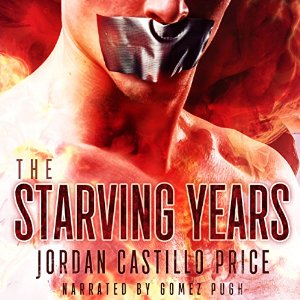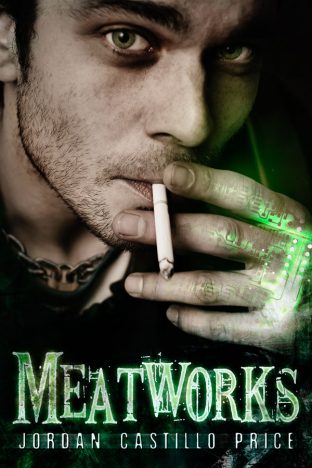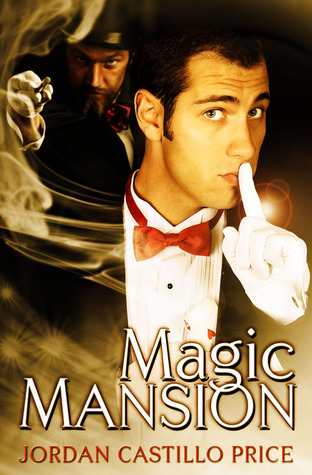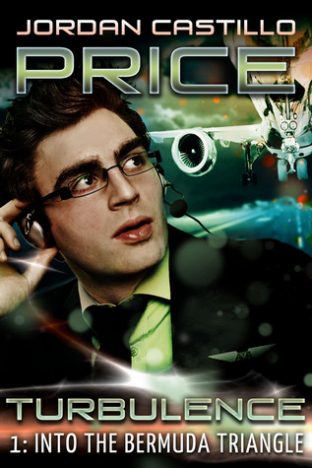 Hello, this is B. A. Brock from Queer Sci Fi, and I have the pleasure of interviewing Jordan Castillo Price today on our blog. I’m a huge fan of hers, and have read quite a bit of her work, so when Scott mentioned that JCP would be up for an interview, I did the fanboy Muppet flail. Let’s dig right in!
Hello, this is B. A. Brock from Queer Sci Fi, and I have the pleasure of interviewing Jordan Castillo Price today on our blog. I’m a huge fan of hers, and have read quite a bit of her work, so when Scott mentioned that JCP would be up for an interview, I did the fanboy Muppet flail. Let’s dig right in!
BA: What I love about your works, is how you can use modern language, familiar to the reader, and yet still create these fantastic science fiction worlds. What do you like about working in the urban scifi genre? What are its limitations?
JCP: I write the type of works that I love to read, and my favorite sort of fiction is speculative. What I really like is something set in the world as we know it, with one minor difference. And that difference changes everything, it has a ripple effect where changes in the world are sometimes big or sometimes subtle, but pervasive and far-reaching. I have a hard time working in any other genre, with the exception of maybe thriller. Most strictly contemporary pieces focused on relationship don’t have enough action to hold my attention.
As for limitations, I sometimes find it hard to describe my science fiction because it is often that subtle-with-one-different-element, but the SF label drives away readers who think Sci Fi is always about aliens and spaceships.
BA: Quite a few of your characters aren’t always the most likeable of people. They are alcoholics, intentionally impoverished, smelly, and at times downright cranky, and yet, you make them endearing. How do you do it?
JCP: I suppose people are just more interesting to me when I show them “warts and all.” I’ve discovered I can get away with quite a lot if I show sufficient and logical cause for the person acting the way they do. If someone is a jerk just for the sake of being a jerk, however, that really doesn’t work. Even if they’re a villain. If the antagonist is abrasive for no reason, if they’re being mean and vindictive just to be nasty, they ring hollow and unsatisfying. So it all comes down to the necessity for characters to do things for reasons. For my more difficult main characters, I am pretty deliberate about not trying to make them likable. I think it’s far more important for a character to be compelling than likable or endearing.
 BA: In Meatworks your characters had a definite punky vibe, and then you shared a picture with us on Facebook, of you, in similar punky fashion. How does past experience play into that book?
BA: In Meatworks your characters had a definite punky vibe, and then you shared a picture with us on Facebook, of you, in similar punky fashion. How does past experience play into that book?
JCP: Meatworks is more autobiographical than any of my other novels. It was set in the neighborhood where I grew up, and the locations were all real locations. Things that happened to my protagonist are coded references to things that happened to me. I suppose you could remove all the punk rock reference and still have basically the same story, but the music and fashion give it a certain look in my minds eye that makes it more interesting to me. It’s not necessarily just a visual, though, there was a certain attitude to punk in the 70’s and 80’s that underpins the main character’s personality.
BA: I love how you don’t “dumb it down” for readers. There was a scene in The Starving Years where something a bit terrifying and confusing happened, but the reader was kept in the dark until later on in the story. I loved it. Care to talk a bit about that, or similar moments in your writing, where you may have intentionally hidden something to reveal later, and how you negotiated that?
JCP: I have a definite tendency to plant things early in the book, or even early in the series, and then have them pan out much later. It seems to me that it’s a very satisfying reading experience to hook together clues for yourself without the author over explaining them. And yet, I have read books where authors directly explain elements right as they happen, particularly Carl Hiaasen, and it doesn’t detract from the work. So I’m not really sure. It might be more of a liability to string out elements in a lengthy way that requires so much trust from the reader. In the future I would like to try writing more of a “potato chip” book, one that isn’t quite as taxing for the reader, but chances are I will sit down to write it and fall into my typical writing patterns.
BA: The Midwest is a big theme in quite a few of your settings. Why?
JCP: I’ve lived in the Midwest my whole adult life, so I don’t really know anything different. Other Midwesterners presume I’m native, so I imagine I’ve picked up all the mannerisms, whatever they might be. My biggest culture shock was moving from inner city Chicago to rural Wisconsin. It took me a couple of years to calm down and lose the edginess.
BA: This is Queer Sci Fi, so I’d feel remiss if I didn’t ask you something about the gender/sexuality of your characters. Most of what I’ve read from you has been MM, but The Starving Years was MMM, which I found interesting, and you have written some MF. How important is sexuality and gender in your writing? Or do you prefer to deemphasize it for greater effect?
JCP: It’s hard to articulate the importance of gender and sexuality, but I’ll give it a shot. A lot of M/M writers have said if one man is sexy, two men are even better. For me, that’s not it; titillation has little to do with it. In the past when I’ve written stories with a female protagonist, I found I couldn’t bear to put her through any sort of deep conflict, particularly betrayal, because I over identified with her. But were I to write a straight male protagonist, he’d come with a sort of inherent privilege I couldn’t relate to. So for me, the gay male protagonist is removed enough from me, yet close enough to me, to serve as my proxy in the story. I think choosing to write about queer characters then means you need to work the consequences of their sexuality into the story. If you could switch the names and genders and have the story be the same, it wouldn’t work for me, their sexuality would feel like window-dressing. So at some point in the future I might write novels without M/M elements if I think it would be better for the plot. I really like writing female characters and I’d like to write some female protagonists the future.
 BA: Magic Mansion was a book about a magic reality show, and only after I had read it, an author friend of mine mentioned something I didn’t know: you set up a voting system with your fans, and they got to vote who was eliminated while you were writing it! Tell me what that was like for plot planning, etc.
BA: Magic Mansion was a book about a magic reality show, and only after I had read it, an author friend of mine mentioned something I didn’t know: you set up a voting system with your fans, and they got to vote who was eliminated while you were writing it! Tell me what that was like for plot planning, etc.
JCP: I used to write serially and publish stories for free in my monthly newsletter. I actually did several stories that way: Zero Hour, The Starving Years, Turbulence and Magic Mansion. For Magic Mansion and The Starving Years, I incorporated voting into the process to give readers a more interactive experience.
Writing according to vote made for an interesting collaboration. I tried to make all the choices viable, so that no matter how the vote went I’d have somewhere to go with it, but still it was natural I had hopes for a certain choice. And then readers would choose the “throwaway option” I figured wouldn’t appeal to anyone. But whatever happened, I made it work. I was pretty bummed when they voted out the most interesting annoying character from Magic Mansion first! I was eager to give her all kinds of outrageous passive-aggressive lines, and she got voted out.
I was about to say I generally knew where each novel was going…but looking back, I probably didn’t. Particularly Magic Mansion. I had no idea the “team” dynamics in the story, with the two main guys being on opposing teams, would turn out to be so important. I had no idea one team would adore one another like a big happy family and the other would be sleeping with one eye open, but it made for some pretty compelling tension.
Actually, I don’t think I even knew who was going to win until the end.
I also set up The Starving Years as a love triangle, but so many readers wrote in that they wanted the three main characters to end up together that I ended up going in that direction because I wanted it too.
BA: You’re an independent publisher. What do you like about it, and what are its limitations?
JCP: I adore having control of all my editorial decisions, my timeline, and my cover art. Honestly, I can’t imagine an offer that would tempt me to give up that autonomy. The only limitations I can think about are the fact that plenty of folks think “self-published” is unprofessional and crappy, that indie authors are less legitimate. But I find it doesn’t really concern me. If I get to present my work the way I want to, it doesn’t matter to me if some segments think less of it, as long as I can reach my readership.
 BA: You’re not only an author, but an artist, and you do your own cover art. I was very impressed with Meatworks, and some of your other covers. Desmond is completely captured in the eyes of your cover model, and there were tantalizing little details about the book in the image, as if you were telling a story with the cover itself. Want to talk about that process, and any other covers you’d like to mention?
BA: You’re not only an author, but an artist, and you do your own cover art. I was very impressed with Meatworks, and some of your other covers. Desmond is completely captured in the eyes of your cover model, and there were tantalizing little details about the book in the image, as if you were telling a story with the cover itself. Want to talk about that process, and any other covers you’d like to mention?
JCP: Although I was already a professional graphic designer, doing my own cover art was a steep learning curve, and it’s something I don’t think I will ever truly master because software keeps evolving and styles keep changing. The process has shifted for me. Lately my thinking is that 90% of the cover’s purpose is to look professional, catch the reader’s eye, and telegraph the genre. And then the other 10% can hint at the story or the character. But the main thing is for it to say “this is SF,” or “this is paranormal” or whatever.
So usually for the process I start by finding professional looking covers that have a feel similar to the feel of my story and analyzing the colors, compositions and fonts, and thinking about how to put together something similar that will convey my story effectively.
Meatworks was challenging. It’s a story about a guy with a robot arm, yet I knew I couldn’t be too literal about that in the cover without it looking silly, and the story is serious, even dark. The thing about epublishing is that cover art isn’t set in stone and I can always update my covers. I would probably freshen up that cover at some point, maybe re-do the typography and make the main image less murky.
One of my favorite covers I’ve done is The Turbulence Collection, an episodic story about a flight crew who fly a route through the Bermuda Triangle. I studied film posters for that look and was pleased with the way it turned out.
BA: You’ve made several of your novels available as audiobooks. What’s it like having your work interpreted in another medium?
JCP: I’ve always enjoyed audiobooks so it felt like I’d really “arrived” when I was able to produce audio of my own work. With a talented voice actor, the stories are elevated to another level, almost like a halfway step toward TV/film.
The Starving Years just came out in audio and Gomez Pugh really brought a lot to the three main characters, from Nelson’s flippant breeziness, to Tim’s painful sincerity, to Javier’s delicious exotic accent and major attitude.
Hearing the audio can be a very different experience than reading. Prose can be breezed past in a quick reading, it can be easily skimmed. Hearing it performed by Gomez, I feel like all the words I’ve so carefully crafted really have a chance to shine.
BA: Thanks for joining us on Queer Sci Fi today, Jordan! It was a pleasure, as always.
 Author and artist Jordan Castillo Price is the owner of JCP Books LLC. Her paranormal thrillers are colored by her time in the Midwest, from inner city Chicago, to small town Wisconsin, to liberal Madison.
Author and artist Jordan Castillo Price is the owner of JCP Books LLC. Her paranormal thrillers are colored by her time in the Midwest, from inner city Chicago, to small town Wisconsin, to liberal Madison.
Jordan is best known as the author of the PsyCop series, an unfolding tale of paranormal mystery and suspense starring Victor Bayne, a gay medium who’s plagued by ghostly visitations. Also check out her series, Mnevermind, where memories are made… one client at a time.
With her education in fine arts and practical experience as a graphic designer, Jordan set out to create high quality ebooks with lavish cover art, quality editing and gripping content. The result is JCP Books, offering stories you’ll want to read again and again.
Website: http://jordancastilloprice.com/

Blurb:
Imagine a world without hunger. In 1960, a superfood was invented that made starvation a thing of the past. Manna, the cheaply manufactured staple food, is now as ubiquitous as salt in the world’s cupboards, pantries and larders.
Nelson Oliver knows plenty about manna. He’s a food scientist—according to his diploma, that is. Lately, he’s been running the register at the local video rental dive to scrape together the cash for his exorbitantly priced migraine medication.
In a job fair gone bad, Nelson hooks up with copywriter Javier and his computer-geek pal Tim, who whisks them away from the worst of the fiasco in his repurposed moving truck. At least, Nelson thinks those two are acquainted, but they’re acting so evasive about it, he’s not sure how they know each other, exactly.
Javier is impervious to Nelson’s flirting, and Tim’s name could appear in the dictionary under the entry for “awkward.” And with a riot raging through Manhattan and yet another headache coming on, it doesn’t seem like Nelson will get an answer anytime soon. One thing’s for sure, the tension between the three of them is thick enough to cut with a knife…even one of those dull plastic dealies that come in the package with Mannariffic EZ-Mealz.
B. A. Brock is a reviewer for The Novel Approach and Queer Sci Fi. He enjoys reading, writing, running, family and food, and fills his life with bent bunk. He especially loves to discuss LGBTQ+ literature. His website is http://www.babrockbooks.com. You can find him on Goodreads: https://www.goodreads.com/BABrockBooks.


